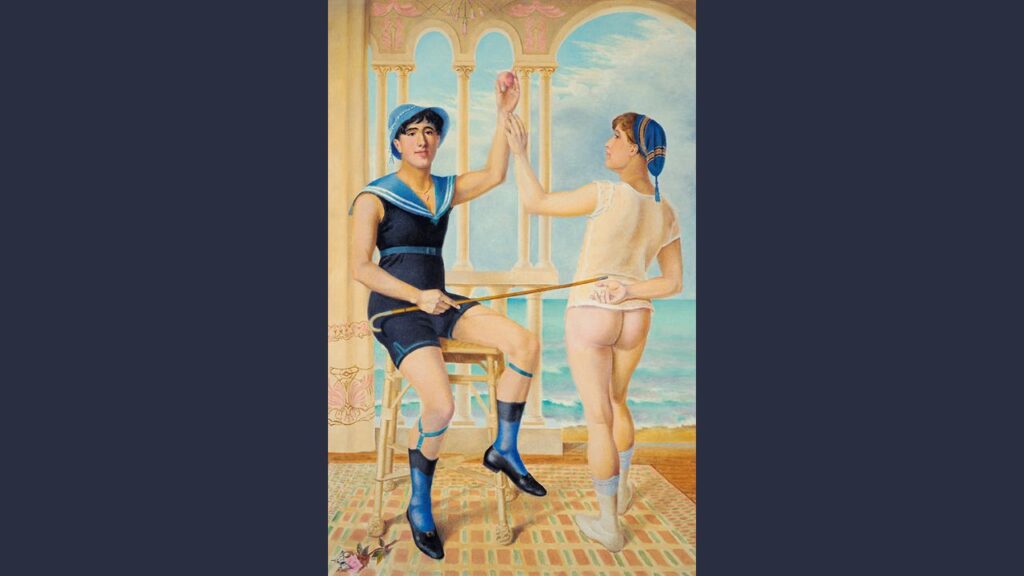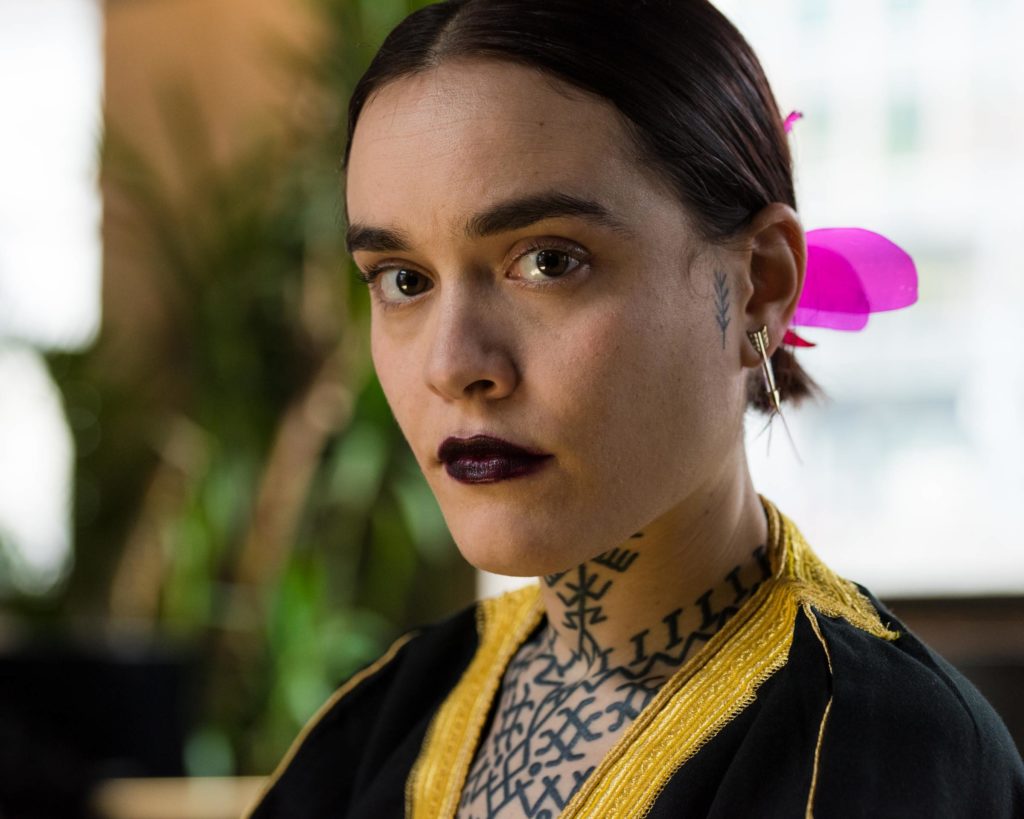Haveit Collective: “When we get angry, we use it for our art”
Made up of two pairs of sisters in their twenties, the Haveit collective uses art and performance to draw attention to issues like LGBTQ rights or violence against women, still considered taboos in Kosovo today.
You all studied art at the Faculty of Art in Pristina. How did you end up choosing performance art as your preferred medium?
Arbërore: I studied film direction and a professor told me that directing was for boys, not girls… obvious sexism! After that comment, I didn’t feel very motivated or inspired to study. I thought it was important to talk about the fact that this profession is deemed to be for boys, not girls, before I started making movies. With Haveit we started discussing these kinds of issues.
Vesa: Haveit allows us to express all our frustrations through art. We like street performances; we created our own space, our own gallery and our own world in which we can express ourselves. Even if it doesn’t change anything, it changed us!
Is sexism widespread in universities in Kosovo?
Hana: I had the same problems in the theatre department, so I dropped out of university in my third year. A professor of mine had a problem with female directors. Once, he told me: “If you want to be a theatre director, you need to have balls. As you don’t have them, you can’t be one.”
Alkete: The same goes for actresses. Some professors would say: “You will probably get married and won’t be doing this for a long time.” It’s very frustrating!
It takes courage to stand up for yourself, to perform on the streets. Which role models did you have while growing up and what did you learn from them?
Hana: My aunt was a puppet theatre director. She was the first in the family to study in Belgrade and she was very young when she left. She lives alone since she didn’t want to get married and compromise her career. She is the most powerful woman I know and I look up to her.
Vesa: Our mother is the strongest woman I know. She has gone through a lot and she still manages to be the happiest woman I’ve met.
Alkete: I consider all the women who live in this patriarchal society as role models. Also, my oldest sister helped me a lot. She was extremely supportive when I told her I wanted to become an actress.
Arbërore: I find our mum very inspiring. When we were younger, she would never make us do chores. She would say: “Do your homework, I don’t want you to end up like me, as a housewife, and ask your husband for money to buy a pack of cigarettes. I want you to have your work, your money; I want you to be independent.”

- Image: Jetmir Idrizi
Was the relationship with your father more tense?
Arbërore: Actually, I’ve had a very good relationship with him ever since I was a child. In Kosovo, it’s a big deal to have four daughters. People would say: “Hopefully your mother will give you a brother.” My mother would feel bad about it, she would blame herself. This is how the society works; they blame a woman for not having a boy. I really appreciate the fact that my father never talked about it in this way, he always said he was very proud to have us and he was very supportive.
How do your families react to your performances?
Alkete: They support us, but they do it in silence. They like that we are travelling as a group and performing abroad. Nowadays, they take the collective more seriously, they respect what we do more because we have been doing this for years. In the beginning, they would tell us: “You shouldn’t be doing this, you should quit.”
You are two pairs of sisters. Do you fight while working together?
All at the same time: Of course! All the time!
Hana: Most of the time, however, we fight between sisters.
You received threats after some of your performances. Do you feel you are in danger because of your work?
Vesa: After The Kiss performance [they kissed in centre of Pristina for Valentine’s day in 2014] was posted online, we received over 100 death threats on social media. We were stressed; we felt scared and insecure. But we got over it quite quickly and realised that these people were only showing their frustrations online. You can feel scared in the heat of the moment, but in general we’re not afraid.
Hana: Most of the people comment on social media. In the streets, they don’t say anything.
LGBTQ rights were at the core of that performance. Has there been a change in the way the LGBTQ community is perceived in Kosovo?
Arbërore: When we did The Kiss, the situation was much scarier. Now it’s a bit better. The first pride parade in 2017 went well; there was a movie about a gay couple that was a huge hit in the theatres. I think there is hope, because there is a sense of acceptance within the younger generation. They’re more open, more tolerant.
Your first performance was about Diana Kastrati, a woman killed on May 18 2011 in broad daylight by her husband, after having reported him to the police. Why did you decide to make this case your first work?
Vesa: Back in 2011, we would hang out a lot. We would get together and complain, complain, complain. After the Diana case happened, we thought it was about time to do something – not just complain – and we did that performance.

Image: Jetmir Idrizi
What does the artistic decision-making process look like now?
Hana: The Diana Kastrati case was kind of an obvious choice because it was so brutal. It was a huge case and it was upsetting. Then there was this problem with water cuts in the city, so we did a performance about that. We didn’t know what the collective was about in the beginning. We didn’t want to label ourselves. Performance by performance, we defined ourselves together and we realised there were certain issues that affect us more than others. What disturbs us the most is sexism, because we experience it on a day-to-day basis.
What is it like to be a woman in Kosovo today?
Alkete: There are over a thousand cases of reported domestic violence a year, many murders, and this is really frustrating. All of these rape and sexual harassment cases, well, they’re not taken seriously by the police.
Vesa: The police started to take it more seriously only recently, before if you would go see them…
Alkete: …They would almost say something like: “Beat your wife inside, so that the neighbours don’t complain.” Now it’s not like that, but it’s still bad. We don’t feel safe. When I go home in the evening, I always take a taxi. If I would get harassed, I would not go to the police. That would just make my life more complicated. The police would ask me: “Why were you alone this late? Were you drunk? What were you wearing?”
Hana: If I see a group of men in the streets, I try to avoid them. I immediately know that they will yell something at me, something I don’t want to hear.
Domestic violence is one of the most pressing issues in Kosovo today [according to a survey from the Kosova Women Network, 63.5 per cent of women said they experienced sexual harassment, compared to 24.3 per cent of men. Over 40 per cent of female respondents claimed they had been victims of domestic violence.] It inspired another performance of yours called Three billboard in Pristina. The billboards read: “How many more missed calls?”, “Diana Kastrati” and “Zejnepe Bytyqi” [two women killed by their husbands]. How did people react?
Alkete: We put the billboards in front of the police station in order to highlight that cases like these are never being solved or taken seriously. There were some politicians that shared the posts about the performance…
Vesa: We only got good feedback from people. I don’t know what the police thought, but who cares. Diana Kastrati’s mother told us she was very thankful that people didn’t forget her daughter’s name.
How does the inaction on the part of the authorities make you feel?
Alkete: It makes us want to continue because maybe we’ll get somebody’s attention, maybe someday these things will be taken seriously.
Vesa: When we get angry, we use it for our art.

Image: Jetmir Idrizi
Do you think of yourselves as feminists? And if so, what do you think that word means in Kosovo today?
Hana: It means we need to have equal rights and to be treated as humans. To be a feminist in my country is to fight for that. We don’t do #MeToo or any of these social media things, because we have these deep – or basic, rather – problems. Our feminism might look different than European feminism because there, they have ‘first world problems’. Our problems are somewhat more violent. We see domestic violence, murders, killers walking freely and raising their children, and nobody arresting them. Maybe what we have here is more of an old, primitive feminism [laughs].
You mentioned the #MeToo movement. Did it have any impact on feminism in Kosovo?
Alkete: We have these very basic problems, we’re not there yet. But the #MeToo movement is relevant for me. I’m an actress and I understand these issues. It’s good it went viral because it empowers women everywhere in the world.
Kosovo also has its specific problems as a country, which experienced a conflict only 20 years ago…
Hana: Most of the people are still very traumatised because of the war. We have many war rape victims and for a long time, nobody cared about them. Whatever you do with regards to this topic, it’s feminism, because you raise your voice for the women who got raped in a society that ignored them in order to glorify the army. Thousands of women got raped and the army wasn’t there to protect them! It was only recently that rape victims were officially recognised as war victims in the eyes of the state.
Alkete: Many women who got raped never told their stories because they feel ashamed; they are afraid to talk about it openly. [It is estimated that 20 000 people experiences sexual violence during the war but many victims are afraid to come forward. The NGOs dealing with the issue have identified around 1000 who have told their stories, reports the Kosovo-based magazine Kosovo 2.0.]
Because of the pending visa liberalisation process, Kosovars cannot travel freely. Does this impact the way you think about Europe?
All in one voice: We don’t really think about Europe…
Alkete: We once refused a residency in Vienna [because of the whole visa process], and it also meant that we weren’t desperate to go to Europe. We want to be treated the same way other artists are. We don’t feel inferior, but to get treated like this when applying for visas is depressing, and people here are treated like this all the time. At that point, we just wanted to say: “Haveit, from Kosovo with love. F*** off.”

The interview was published in the framework of Sisters of Europe. Sisters of Europe is an empowerment project to inspire and better connect women across Europe, through 17 inspiring stories, a series of events and a list of concrete proposals. Read the other interviews here.












